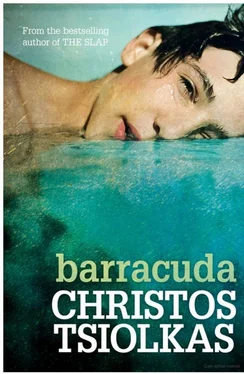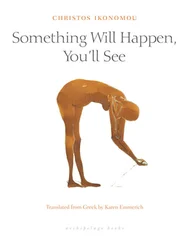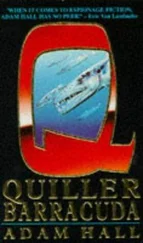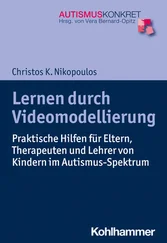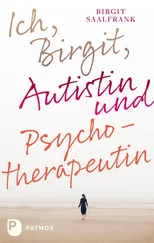‘Of course, I’m not sure how much longer we’re going to stay in Beijing — Katie really wants the kids educated in Europe or the States.’ Luke squinted out to the long horizon of planes outside the windows. And then it was all about how the school system was too rigid in China, it was all rote learning, with no space for imagination, how they should have been in London or DC by now, except for the damn economic crisis that had stuffed everything up. All the jobs were in China, it looked as though they were going to have to stay put in the Middle Kingdom for the moment, but he didn’t want to raise the kids there, where everyone called them bananas: yellow on the outside, white on the inside. They didn’t want the ex-pat life for their kids, it wasn’t the real world. If they ever returned to Australia, it would be for their kids’ education, but they’d prefer Europe or the States. How long could the frigging economic crisis last, anyway?
And then, coyly, as if he couldn’t quite believe he was doing it, he slid the phone across to Dan to show him a slideshow of photographs: Luke in a short-sleeved shirt, a toddler on one knee, a little girl in a smock beaming at the camera (that’s Costa, that’s Lissa); an unsmiling Katie clutching a giggling Lissa, a craggy hillock of rock jutting out of a jade sea behind them (we went to Vietnam last Christmas); Lissa standing in front of a thin grey-haired man, a petite harried woman holding the little boy (that’s Mum and Dad, back on Samos — we took them there for their thirtieth anniversary). The final image was of an elderly Asian woman, much older than Luke’s mother, unsmiling, looking straight at the camera. Lissa had her arms wrapped tight around the woman, Costa was hugging her neck — that was their nanny, that was the apartment at home.
‘They’re gorgeous,’ said Dan. ‘What beautiful kids.’
And suddenly it was as though no years had past and sculpted and changed them, and Luke’s grateful smile was that of the little boy who’d always looked up to Danny Kelly. The awkwardness started to dissipate. Luke reached out and softly grazed knuckles with Dan. ‘It’s so good to see you, mate.’ He slumped back in his seat. ‘They are gorgeous kids, Katie and I are really proud of them. And I’m glad we raised them here — I’m glad we can offer them the world.’
And that was when Dan realised that Luke wasn’t really challenging Dan about going home — that he wasn’t thinking about his friend but was justifying his own actions, to himself, convincing himself that he and Katie were doing the right thing. Changing or retreating, both were futures taken on trust.
Dan now knew how to answer his friend, he knew exactly what he had to say. ‘I have to go home. I miss my family, I want to return to them. I want to see my new niece.’
It was the right answer. Luke’s quietness and warm smile said that he understood.
Dan talked about Scotland, Luke explained China. They had another beer each and then delicately, ever so carefully, Luke asked about the break-up with Clyde. Dan thought Clyde would have emailed Katie, maybe even spoken to her about it. How much did Luke know? The digital departure screen clock above them was counting down and there wasn’t time enough for that conversation. Dan did want to tell Luke about Clyde, and maybe one day he would. But he and Luke needed more time, they had to draw maps for each other, to mark the borders of their experiences, to show the roads they had travelled, to shade in the frontiers they had reached, and to plot their cities of work and love and desire. A terrible sadness overwhelmed him, at how far they had travelled from one another, how much time it would take to sift and reconcile their shared past to their individual presents. He wished there was time to explore the kingdom his friend had created.
He would make sure there would be.
Luke walked him to the departure gate. His hug was crushing. Dan couldn’t believe the strength in his friend’s arms, the power of the embrace. The man and their history was in that embrace.

‘I was going to visit you in Scotland, mate, I really was. It’s just that time got away from me. I’m sorry.’
Theo and Dan were in the backyard of their parents’ house. Theo was rolling a joint; even though the night was cool, he was wearing a blue cotton singlet. It was almost scandalous how Dan couldn’t stop looking at his brother. The younger man’s body was slim, athletic, his skin was tanned and burnished from his days working in the sun. Theo had allowed his hair to grow long; his curls fell to his shoulders, and he had to keep brushing them away from his eyes. He held the joint out to his brother but Dan declined.
‘Still saying no to drugs, eh?’
‘It’s not a moral issue,’ Dan said. ‘They just don’t do me any good. They make me feel like I’m drowning.’
Theo sucked hard on the spliff, then expelled the smoke in one long thick plume. ‘Bro, it’s the only thing keeping me together at the moment.’
Their parents had finally gone to bed. His mother hadn’t been able to stop hugging and kissing Dan from the moment he’d stepped through the security doors at Melbourne Airport. His father’s reaction was more reserved, but he too grabbed hold of his son, brought him close and said how good it was to have him back.
No one asked about Clyde, and Dan was relieved. Instead they listened as he talked about Scotland, about Glasgow and Partick, about the southside and the westside, described the uncanny colours of the Argyle coast and forests and bens; blues and greens he’d never seen before, a softness to the light that he’d never known in Australia.
Then he’d asked them about Regan and his father said, ‘I just want her here, son, she should be home.’ His mother was crying, and Scotland and Europe and that world was stripped from him and soon forgotten. He was back home.
Now, for the first time in years it was just him and Theo alone together and talking.
‘What’s been happening?’
‘Same as you, mate. I broke up with Annalise. It’s been nearly two months and it still kills me, it still fucking does.’ Theo was peering through a tangle of golden curls. ‘Is it the same with you?’
Dan then noticed the heavy shadows under the younger man’s eyes, the sharp, gaunt lines of his jaw and his cheekbones. He wasn’t sleeping, Dan thought, and he wasn’t eating. Dan went and sat on the concrete step just below Theo. He wanted to put a hand on his brother’s knee, just to touch him — he knew that more than words, touch could speak. But he didn’t know if his brother wanted it; he feared that Theo would recoil from it.
He didn’t know Annalise, had never met her.
‘How about you?’ Theo’s question was an appeal. ‘Does it still hurt not being with Clyde?’ Theo needed to not feel alone with his hurt.
‘I wasn’t in love with Clyde,’ Dan said. ‘I realised I wasn’t because of how relieved I was when it ended.’ He didn’t touch Theo; he leaned down and ran his fingers through the unmown grass. ‘I think meeting Clyde brought me back into the world.’ Dan could feel his cheeks burning, his heart racing. ‘You know, after fucking up so badly, ending up in prison.’ The next words were the hardest, they laboured to come forth from deep in his belly, from within the very cells of his blood. ‘You know,’ he continued, his voice husky, ‘after failing at swimming, after failing at everything.’ He was shivering, but not from cold. He couldn’t look at his brother, couldn’t bear what he might see there. ‘I mean, failing all of you.’ He stopped, drank some beer to cool his mouth and tongue and throat. His whole body was burning.
Читать дальше
